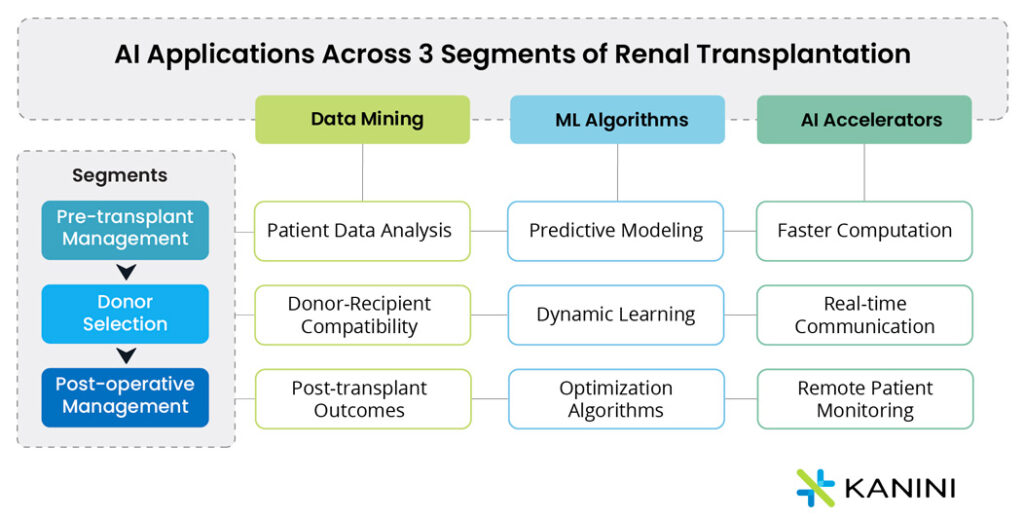The Traditional Approach and the Need for Change
These processes of matching organ donors to potential recipients have been predominantly manual, leading to process inefficiencies and delays. According to recent statistics from the Organ Procurement and Transplantation Network, the average waiting time for a kidney transplant in the United States is approximately three to five years, emphasizing the urgent need for a more efficient and precise approach.
The Revolutionary Role of AI in Renal Transplantation
AI plays a pivotal role across all three segments of the renal transplantation process — Pre-transplant Management, Donor Selection and Postoperative Management.

| AI Application in Pre-transplant Management | ||
|---|---|---|
| Data Mining | ML Algorithms | AI Accelerators |
| Patient Data Analysis | Predictive Modeling | Faster Computation |
| Meaningful Patterns: AI can analyze the vast dataset of demographic information of donors and recipients to identify patterns that contribute to successful transplant outcomes. | Outcome Prediction: ML algorithms can predict the likelihood of transplant success based on the characteristics of the donor-recipient combination, enabling better decision-making. | Enhanced Processing: AI can significantly speed up the computation of complex algorithms involved in matching, allowing for quicker and more efficient donor-recipient pairing. |
| Medical History: Analyzing historical patient data can reveal the potential impact of pre-existing conditions on transplant success and further help in refining the matching criteria. | Risk Assessment: Machine learning models can assess the risk of organ rejection or complications, helping in prioritizing candidates with higher chances of successful outcomes. | Real-time Matching: AI can allow real-time processing of data, ensuring prompt matching, crucial in time-sensitive transplant scenarios. |
| AI Application in Donor Selection | ||
|---|---|---|
| Data Mining | ML Algorithms | AI Accelerators |
| Donor-Recipient Compatibility | Dynamic Learning | Real-time Communication |
| HLA Matching: Human Leukocyte Antigen (HLA) compatibility is crucial for transplant success. AI can identify patterns in HLA profiles, improving the accuracy of matching and reducing the risk of rejection. | Adaptive Algorithms: ML algorithms can continuously learn and adapt to evolving data, ensuring that the matching process stays up to date with the latest medical knowledge and trends. | Handling Large Datasets: AI accelerators enhance the scalability of the matching system, enabling it to handle large datasets efficiently, including data from diverse sources such as genetic databases and electronic health records (EHRs). |
| Cross-matching History: Studying past cross-matching results can refine algorithms to predict potential issues in real-time, resulting in better donor-recipient pair selection. | Personalized Matching: Machine learning enables the customization of matching criteria for each patient, considering unique characteristics and optimizing compatibility. | Interoperability: AI accelerators enhance the interoperability of systems involved in the donor selection process, ensuring seamless communication between different healthcare facilities and databases. |
| AI Application in Post-operative Management | ||
|---|---|---|
| Data Mining | ML Algorithms | AI Accelerators |
| Post-transplant Outcomes | Optimization Algorithms | Remote Patient Monitoring |
| Long-term Success Factors: AI can analyze post-transplant data to identify factors contributing to long-term success and use it for continuous improvement of the matching process. | Improvement in Success Rate: Based on the transplant results, algorithms can explore various combinations of donors and recipients to further optimize the algorithm and hence improve the success rate. | Wearable Device Integration: AI accelerators support the integration of data from wearable devices, enabling remote monitoring of postoperative patients beyond the traditional hospital setting. |
| Rejection Patterns: Understanding rejection patterns through data mining allows for proactive measures in identifying and addressing potential issues. | Real-time Adjustments post-transplant: Algorithms can dynamically adjust matching criteria based on real-time data, accommodating sudden changes in patient conditions post-transplant. | Efficient Data Transmission: Accelerated processing ensures that information from remote monitoring devices is promptly analyzed, allowing for timely medical interventions. |
Benefits of AI in Dialysis, Organ Allocation and Kidney Transplant Processes
Here are the manifold benefits of adopting AI in dialysis treatment, organ allocation and the broader spectrum of kidney transplant procedures –
- Individualized Treatment Regimens:
- AI applications analyze patient data to create personalized dialysis treatment regimens.
- This individualization improves treatment effectiveness, minimizing side effects and enhancing overall patient well-being.
- Predictive Maintenance for Dialysis Machines:
- AI enables predictive maintenance models for dialysis machines, anticipating potential malfunctions before they occur.
- This reduces downtime, ensures the reliability of equipment, and minimizes disruptions to patient treatments.
- Real-time Monitoring:
- AI-powered monitoring systems continuously analyze patient vitals and dialysis parameters in real time.
- This allows healthcare providers to respond promptly to any deviations, enhancing the safety and efficacy of the dialysis process.
- Quality Improvement:
- AI contributes to quality improvement initiatives in dialysis centers by analyzing data on treatment outcomes, patient experiences, and operational efficiency.
- This data-driven approach facilitates ongoing enhancements in the delivery of dialysis services.
- Early Detection of Complications:
- AI applications can identify early signs of complications during dialysis, such as changes in blood pressure or fluid levels.
- Early detection enables proactive interventions, reducing the risk of adverse events.
- Precision Matching:
- AI algorithms can analyze a multitude of patient data, including genetic information, medical history, and compatibility factors.
- This precision matching enhances the accuracy of donor-recipient pairing and subsequently increases the likelihood of successful transplantation.
- Optimized Organ Allocation:
- AI contributes to dynamic organ allocation systems, considering real time data such as transplant urgency based on the patient’s condition, organ transportation feasibility, and compatibility.
- This optimization ensures fair and efficient organ distribution, addressing the challenges of organ scarcity.
- Reduced Waiting Times:
- Streamlined matching processes facilitated by AI can significantly reduce the time patients spend on organ transplant waiting lists.
- This acceleration is crucial, particularly considering the critical nature of organ transplantation and the limited availability of donor organs.
- Personalized Treatment Plans:
- AI-driven models can predict post-transplant outcomes based on individual patient characteristics.
- This allows for the development of personalized treatment plans, optimizing patient care and increasing the chances of long-term transplant success.
Global Trends in Application of AI in Renal Transplantation
- Genomic Data Analysis:
- Precision Medicine in Immunosuppression:
- Telemedicine Integration:
- Blockchain for Data Security:
- Cross-institutional Collaboration:
- Ethical Considerations and Bias Mitigation:
There is growing awareness about the ethical implications of AI in healthcare, including organ transplantation. Efforts are being made to ensure fairness, transparency, and the mitigation of biases in AI algorithms used in the decision-making process.
Looking Ahead
Author









